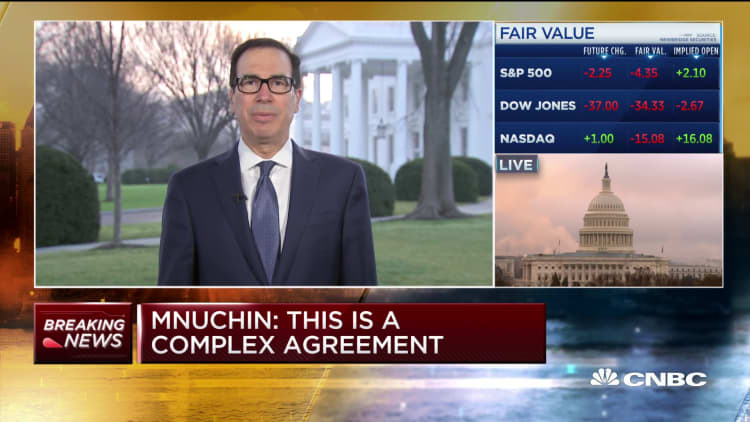
Treasury Secretary Steven Mnuchin told CNBC on Wednesday that a future "phase two" trade deal with Beijing would ease U.S. tariffs on goods purchased from China even if the next agreements are segmented into multiple rounds.
"Just as in this deal there were certain rollbacks, in phase two there will be additional rollbacks," he told CNBC. "It's really just a question of — and we've said before — phase two may be 2A, 2B, 2C. We'll see."
"The first step is really focusing on enforcement, but this gives China a big incentive to get back to the table and agree to the additional issues that are still unresolved," he added.
Mnuchin joined CNBC hours before top American and Chinese negotiators planned to sign the phase one deal that is expected to include an agreement by China to purchase some $200 billion of U.S. goods over two years.
But the deal is also expected to lower structural barriers for American companies hoping to do business in China. Specifically, the pact is said to address concerns of U.S. executives who have long complained that they are routinely pressured, if not outright forced, to share key technologies in exchange for market access.
Though Beijing denies it forces foreign companies to surrender proprietary technologies, American companies say they're often compelled to share business secrets through backdoor tactics like joint ventures. Such practices, combined with Beijing's policy of subsidizing domestic business, can build competitive rivals to American companies seemingly overnight.
One of the thorniest issues between the U.S. and China over the last two years, accusations of forced technology transfers and intellectual property theft, should be remedied in the first phase deal, Mnuchin said.
"It's not a question of admission, it a question of what they're going to do," the Treasury secretary said. "And China has agreed to put together very significant laws to change rules and regulations and have made very strong commitments to our companies that there will not be forced technology going forward."
Other areas of concern expected to be tackled in the deal include the misuse of pharmaceutical-related intellectual property and access for U.S. financial companies to Chinese markets. Those qualms helped drive President Donald Trump to start a tit-for-tat trade war with China nearly two years ago, when he first announced tariffs on imported steel and aluminum.
"I think [it's] a very big win for our technology companies, for our businesses and for American workers," Munchin added. Further, should Beijing fail to abide by the phase one stipulations, Mnuchin said Trump can always reimpose or hike tariffs on Chinese imports.
The feud between the globe's two largest economies has resulted in each side slapping levies on billions of dollars' worth of imports and forced major American corporations to shift supply chains throughout Asia.
U.S. farmers, in particular, have taken a heavy hit after China began buying soybeans and other agricultural commodities from Brazil and other South American countries.
— CNBC's Eunice Yoon contributed reporting.


